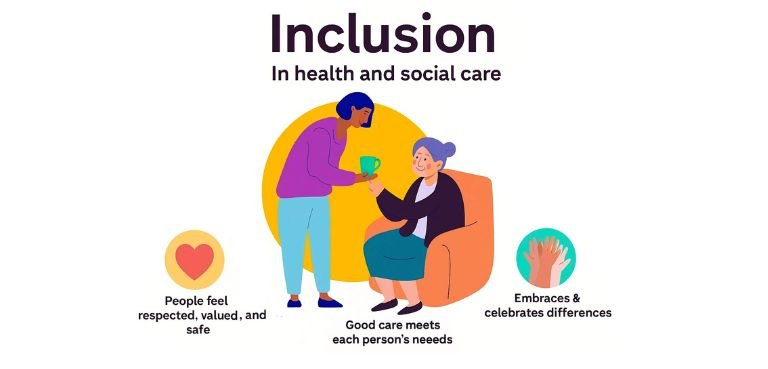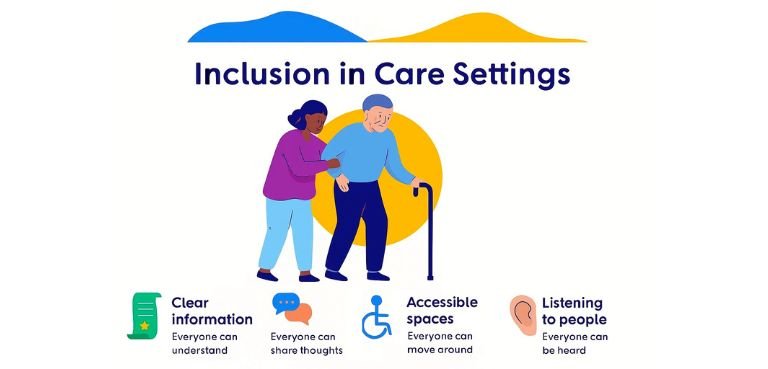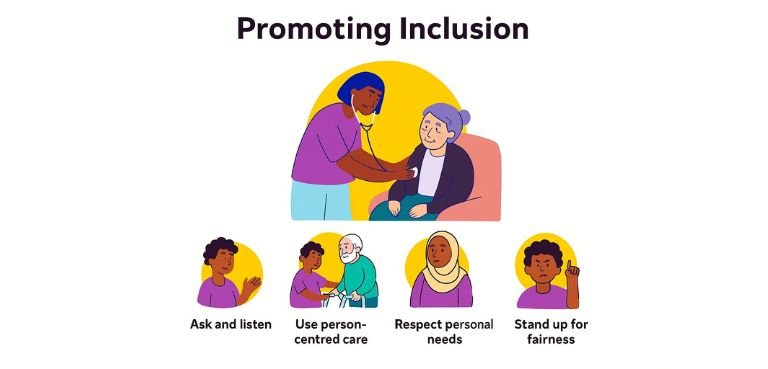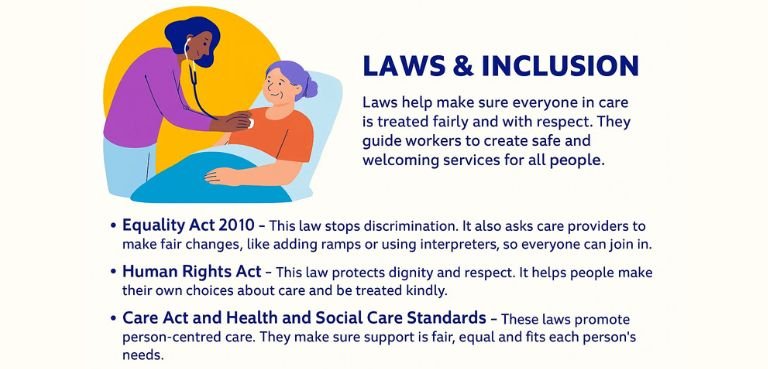No products in the cart.
Inclusion means everyone can take part, feel valued, and be treated with respect. It makes sure all people, whether they work or receive care, feel welcome and supported.
Inclusion also means listening to everyone. Each person has different needs, backgrounds, and stories. So, care workers give support in a way that fits each person. No one feels left out or treated unfairly. When people feel included, they feel safe and happy. They know their voice matters. This builds trust and makes care settings friendly and kind. Overall, inclusion means caring about people as individuals. It’s about respect, kindness, and making sure everyone belongs.
In this article, we talk about what inclusion means in health and social care. You will learn how it helps people feel valued, respected and involved in their care. We will also look at why inclusion is important, what problems can stop it, and how care workers can make care fair for everyone. By the end, you will understand how inclusion helps create a safe and caring place for all.
Inclusion Meaning in Health and Social Care

Inclusion, meaning in health and social care, is about more than just being there. It means being part of things and feeling involved. Everyone should feel valued, respected, and listened to. Inclusion means caring for people as individuals. Workers respect each person’s choices, culture, religion, and background. They also think about things like language, age, gender, and disability. Everyone is different, and that makes care special.
Good care changes to meet each person’s needs. If someone needs help to talk or eat certain foods, they still get the same quality of care. Inclusion helps people feel safe and happy. It makes health and social care a place where everyone belongs.
If you want to learn how to promote inclusion and provide person-centred care, explore What is Inclusive Practice in Health and Social Care course at Wise Campus. These flexible online courses help you build the right skills to make a real difference in people’s lives.
Why Is Inclusion Important in Health and Social Care?
Inclusion makes sure everyone feels part of things. It keeps people safe from being left out, ignored or treated unfairly. Everyone deserves care that makes them feel valued and respected.
Here’s why inclusion matters so much:
- Protection for all. No one should feel left out or treated differently because of who they are.
- Building trust. When people feel safe and listened to, they share their needs and wishes more openly.
- Better care. People who feel included take part more in their care plans and follow advice with confidence.
- Improved well-being. Feeling included helps people stay confident, calm, and positive about their care.
- A sense of belonging. Inclusion makes care settings warm, kind, and welcoming for everyone.
When people feel they belong, they become happier, healthier, and more supported in every part of life.
How Does Inclusion Support Equality and Diversity?
Inclusion helps make equality and diversity part of everyday care. Equality means fairness for everyone. Diversity means respecting people’s differences. When care workers include everyone, care becomes fair and kind. Here’s how inclusion supports equality and diversity:
- Fair care for everyone. Each person gets the same chance to join in and feel valued.
- Personal support. Care meets each person’s own needs, not the same for everyone.
- Respect for all. People’s culture, language, religion, and background are understood and valued.
- Challenging unfairness. Care workers speak up when someone is treated badly.
- Welcoming difference. Inclusion helps people see that being different is a good thing.
When inclusion, equality, and diversity come together, care settings feel safe and happy. Everyone feels respected, supported, and free to be themselves.
What Are Examples of Inclusion in Health and Social Care Settings?

Here are some simple examples of inclusion in care settings:
- Clear information. Give leaflets or forms in large print, easy-read versions, or other languages. This helps everyone understand.
- Good communication. Use interpreters, hearing aids, or picture cards so people can share their thoughts easily.
- Accessible spaces. Arrange rooms and equipment so people with mobility needs can move around and take part.
- Listening to people. Invite service users to meetings about their care and follow what they say.
These small actions make a big difference. When people feel included, they feel happy, safe, and part of the care community.
How Do Health and Social Care Workers Promote Inclusion?

Health and social care workers play a big role in making sure everyone feels included. They listen, respect differences, and give care that suits each person’s needs. Inclusion starts with kindness and understanding.
Here are some simple ways workers promote inclusion every day:
- Ask and listen. Talk to the person about what they want and write it in their care plan. This shows respect for their choices.
- Use person-centred care. Give support that fits the individual, not the same for everyone.
- Respect personal needs. Check for cultural, religious, or dietary needs before giving care. This helps people feel valued and comfortable.
- Stand up for fairness. Challenge unkind or non-inclusive behaviour from staff, visitors, or anyone else.
By doing these things, care workers make people feel safe, respected, and part of the community. Inclusion helps everyone feel they belong and are treated with real care.
What Barriers Can Affect Inclusion in Care Environments?
Even in caring places, some things can stop people from feeling included. These problems are called barriers. The good news is that when we see them, we can make changes to help everyone feel part of things.
Here are some common barriers to inclusion:
- Communication barriers. Language differences, hearing loss, or sight problems can make it hard to talk or understand.
- Environmental barriers. Steps, narrow doors, or poor signs can make it hard for people to move around safely.
- Attitudinal barriers. Unkind beliefs, bias, or low expectations can make people feel judged or ignored.
- Organisational barriers. Rigid routines or a lack of training can make care less fair for some people.
When workers notice these barriers and fix them, care becomes kinder and more open. Everyone feels safe, welcome, and part of the care community.
How Can We Overcome Barriers to Inclusion?
Barriers can sometimes make people feel left out or ignored, but with care and small changes, we can make things better for everyone. Training staff on equality, diversity, and inclusion helps everyone understand how to treat others fairly.
Changing the environment — for example, by adding ramps, wide doors, or clear signs — makes spaces easier and safer for everyone to use. Good communication is also important; speaking in ways people understand, and using translators, pictures, or advocates when needed, helps everyone feel included. It’s also vital to stay flexible, adjusting rules and care plans to respect each person’s culture, religion, and personal needs. When we do these things, care becomes fair, kind, and welcoming, and everyone feels safe, valued, and part of the community.
What Are the Benefits of Inclusion for Service Users and Staff?
Making care inclusive helps create a warm and friendly place for everyone. When people feel part of things, they feel safe, respected, and happy. This helps both the people receiving care and the staff who give it. People who receive care get more dignity and independence. They can make their own choices and feel proud of what they can do. This gives them confidence and helps them stay independent.
Care also becomes more enjoyable. When support feels fair and personal, people are happier and more trusting. This means there are fewer problems or complaints. Staff also benefit from inclusion. They feel respected and valued for their work. They gain confidence and learn how to support people from different backgrounds and with different needs.
Inclusion also makes care safer. When people feel listened to, they speak up if something is wrong. This helps protect everyone and makes care a safer place. When everyone feels welcome and respected, care becomes kind, calm, and positive. People work together better, and everyone feels they belong.
How Does Legislation Support Inclusion in Health and Social Care?

Laws help make sure everyone in care is treated fairly and with respect. They guide workers to create safe and welcoming services for all people.
Here are some important laws that support inclusion:
- Equality Act 2010 – This law stops discrimination. It also asks care providers to make fair changes, like adding ramps or using interpreters, so everyone can join in.
- Human Rights Act – This law protects dignity and respect. It helps people make their own choices about care and be treated kindly.
- Care Act and Health and Social Care Standards – These laws promote person-centred care. They make sure support is fair, equal and fits each person’s needs.
When care services follow these laws and keep good records, they show respect and care for everyone. This builds trust and helps people feel they truly belong.
Final Thoughts: Understanding Inclusion Meaning in Health and Social Care
Inclusion, meaning in health and social care, is about people. Everyone should feel welcome, respected, and treated fairly. When people feel included, they feel happy and safe. It helps them trust their carers and take part in their own care.
If you want to learn how to give kind and fair care, check out the Health and Social Care courses at WiseCampus. These courses teach you how to support others with respect and understanding. You’ll learn real skills that help people and build your own career.
Start learning today and make every care setting a place where everyone belongs.
FAQs
- What is the true meaning of inclusion?
True inclusion means making sure everyone feels they belong. It’s about respect, fairness, and helping each person take part fully.
- What does inclusion mean in the NHS?
In the NHS, inclusion means making sure everyone feels valued and respected. It helps all people take part and give their best.
- What best defines inclusion?
Inclusion means making sure everyone feels welcome and valued. It gives all people equal chances to join and take part.
- What are the 4 principles of inclusion?
The four principles of inclusion are being present, taking part, achieving goals, and getting the right support.
- What does inclusion mean in health care?
Inclusion in health care means giving everyone fair and respectful care. It makes sure all people can get the help they need.





